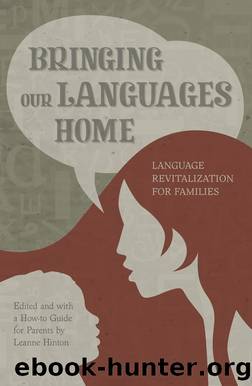Bringing Our Languages Home by Unknown

Author:Unknown
Language: eng
Format: epub
ISBN: 9781597142243
Publisher: Heyday
Published: 2013-01-15T00:00:00+00:00
Together an incredibly talented group of storytellers, teachers, actors, and artists form the Anishinaabemowin Curriculum Development Project Committee. Their publications range from illustrated picture books to DVDs and theater productions. Some of their resources are used at both the elementary and college level in Michigan because the cultural content is relevant for all age levels. To cite only a few examples, at the University of Michigan we have used the Wenaaboozhoo book and audio CD published entirely in Anishnaabemowin without any translation. 8 We have also used Aanhsokaanhensan: Short Stories for Each Season9 and Wikwemikong Odenang miinwaa Nokaming Dânakiiwanhsan Mikziibiing geyii: Kitchi mewzha Anishinaabe Bimaadziwin (Wikwemikong Village and Surrounding Area: Our History).10 Both of the latter books include translations on each page and language-learning activities at the back of the book. Most importantly, they have been created by and for Anishinaabe people. The historical perspective is ancient. When the narrator asks, âGwiya na giikendan minik nso biboon Anishinaabeg gaa bi igo danokiiwaad?â (Does anyone know how long the Anishinaabeg have lived here?), the answer is not based on primary documents searchable in current libraries of the world. The answer is âmidaatchingshim-daaswaak nso biboonâ (ten thousand years) because that is what the storytellers say. And interestingly, research conducted recently at the University of Michigan proves that indeed, remnants of caribou runs under Lake Huron indicate that those storytellers have been right all along.11
Highly relevant lessons are critical for success in language revitalization. Although we may wish to avoid the issues, when asked, a class of high school studentsâ at Bay Mills wanted to translate a song about sanitariums and death. Not one to shy away from any request that would lead to her studentsâ use of the language, their teacher, Amy McCoy, sent the English lyrics to the teaching team in Ann Arbor. Together, Howard Kimewon, Alphonse Pitawankwat, and I translated the song âWelcome Homeâ written by the heavy metal band Metallica in 1986. At first, we merely wanted to challenge a kid who had yet to connect with the language, but as we worked through the lyrics we found phrases with chilling connections to the problems faced by native youth today. In a world where the Indian âvanishedâ at the start of the century, where poverty and suicide are common and the education system still excludes the worldview of indigenous people in the present, the following lines ring too true: biindigeg maampii gii boontaasegoba ga zhwebgeba (welcome to where time stands still); gaawiin wiika aanjinaagozisii pane gwa mooshkineaapkizi (the moon is full, never seems to change); gibaakwaaigaazoyaanh mii maampii maanda waakaaiganing (they keep me locked up in this cage); and ndâzegiz wii geyabi bimaadiziyaanh (I fear living on). And when Howard and Alphonse, two residential school survivors, came to the line âthe natives are getting restless nowâ it was a priceless lesson to realize the only possible translation is âAnishinaabeg bgooshkaajizheyaawag.â Anishinaabemowin has no means of framing indigenous people as âthe other.â Such terms as âIndians,â ânatives,â âindigenous,â and âaboriginalâ are necessarily self-referential, which turns a phrase intended to invoke fear upside down.
Download
This site does not store any files on its server. We only index and link to content provided by other sites. Please contact the content providers to delete copyright contents if any and email us, we'll remove relevant links or contents immediately.
Cecilia; Or, Memoirs of an Heiress — Volume 1 by Fanny Burney(32527)
Cecilia; Or, Memoirs of an Heiress — Volume 2 by Fanny Burney(31928)
Cecilia; Or, Memoirs of an Heiress — Volume 3 by Fanny Burney(31916)
The Lost Art of Listening by Michael P. Nichols(7476)
Asking the Right Questions: A Guide to Critical Thinking by M. Neil Browne & Stuart M. Keeley(5741)
We Need to Talk by Celeste Headlee(5597)
On Writing A Memoir of the Craft by Stephen King(4919)
Dialogue by Robert McKee(4374)
Pre-Suasion: A Revolutionary Way to Influence and Persuade by Robert Cialdini(4195)
I Have Something to Say: Mastering the Art of Public Speaking in an Age of Disconnection by John Bowe(3864)
Elements of Style 2017 by Richard De A'Morelli(3331)
The Book of Human Emotions by Tiffany Watt Smith(3282)
Fluent Forever: How to Learn Any Language Fast and Never Forget It by Gabriel Wyner(3066)
Name Book, The: Over 10,000 Names--Their Meanings, Origins, and Spiritual Significance by Astoria Dorothy(2962)
Why I Write by George Orwell(2933)
Good Humor, Bad Taste: A Sociology of the Joke by Kuipers Giselinde(2931)
The Art Of Deception by Kevin Mitnick(2782)
The Grammaring Guide to English Grammar with Exercises by Péter Simon(2728)
Ancient Worlds by Michael Scott(2661)
